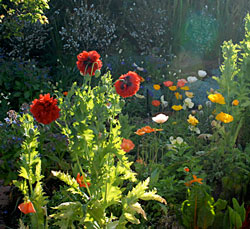Iceland poppies
Q. I planted a beautiful bed of Iceland poppies and the first week everything was fine. I started noticing that the new buds were mysteriously disappearing before they opened? The stems are fine but the buds are cleanly removed from the top of the stem? Our area has wall rats and squirrels could it be that? I never find any remains or partially eaten buds; they’re just gone!! I would appreciate your help. Thanks and Merry Christmas.

Iceland poppies in background, foreground: red Oriental poppy.
A. The thrill of seeing a stunning bed of Iceland poppies (Papaver nudicaule) in full bloom can make a gardener’s day—not only one day but many, all winter and into spring. Thus, losing all the flower buds before they even open is felt all the keener, a perfect example of the other side of gardening, the tragic side when things go wrong. But sometimes failure makes success that much sweeter. I hope that happens in this case.
The mystery is that Iceland poppies are on the list of plants usually untouched by animal problems. Squirrels, rabbits, and even racoons usually shun them because of the prickly texture of their flower stems and calyxes and also because the foliage contains a poison that makes animals feel sick. My guess is that a one particularly hungry rat is eating them and it may be a pregnant female with insufficient food in winter. (Unfortunately, it takes a lot to kill a rat, one of nature’s most successful designs.) Sometimes a rat will take a liking to one particular food and will go round a garden munching on just that one thing. It may be emerging rose canes, thorns and all, or the fresh outer leaves of Madeira geranium (Geranium maderense), or some other odd selection. My guess is that one rat has taken a liking to the emerging buds of your Iceland poppies and found it can put up
with the prickly calyx and thus enjoy the sweetness of the immature petals within, sort of the way some people enjoy cayenne pepper in chocolate. It may even be getting a psychedelic thrill from these buds.
By careful observation you can perhaps tell if it is a rat. Look carefully at the top of the stem where the bud was taken off. Squirrels and rabbits leave an uneven jagged edge at various heights, not always the same, but rats cut off favored plants with a clean, slanting cut as if made by a trained and precise gardener with a very sharp pair of secateurs.
If you have a rat, it is likely just one rat. (There may be more but they may not have developed a taste for buds of Iceland poppies. Do not delay or others may catch on!) Purchase a rat trap, drill a hole in one corner and tie on a long piece of stout string. Bait the trap with a little glob of peanut butter mixed with a little sugar. Rats can’t resist this. Tie the other end of the string to a firm stake, fence, arbor, or something else that can’t be moved or you may lose
your trap. Then cut a hole, like a small door, in the side of a cardboard box and place it upside down over the trap. Otherwise you might kill an inquisitive blue jay or another bird instead of your rat. Leave this overnight and my guess is you will catch your culprit. Fertilize your Iceland poppies so they will put out more
buds. After this untimely and heartrending pruning, they are likely to become more floriferous than ever.


I followed your advice in your book and planted little tiny Iceland Poppies last September. They bloomed nonstop from Christmas till now. Some white linen California poppies joined them last month along with these large poppies in the foreground and the garden was splendid. A poppy heaven.
I took your advice on mixing up Humic acid, yucca extract and kelp with some fish and sprayed in on the trunk my poor failing Pittosporum tree. It has picked up quite a bit. I will spray again in the fall.
I like your site. Just printed the organic fertilizer chart.
Can you tell me why my Iceland poppies bloom and fall over. The flowers stay, but they are hanging over the side of the barrel. Too much/too little water?
Please help.
Thanks
Iceland poppies need full sun. If they are grown in partial shade or any location where a shadow falls on them during the day, they will fall over. Wind can knock them over too, but nine times out of ten it’s shade that does it. Another problem can cause this as well and that is fertilizing too heavily. When fertilizing Iceland poppies never use a “bloom” fertilizer that is designed for flowers only and no growth. Unfortunately the public is attracted to these fertilizers, but underfeeding with nitrogen while overfeeding with potassium and phosphorus is not good for anything except possibly orchids or camellias to stimulate formation of flowers at the correct season of year for each.